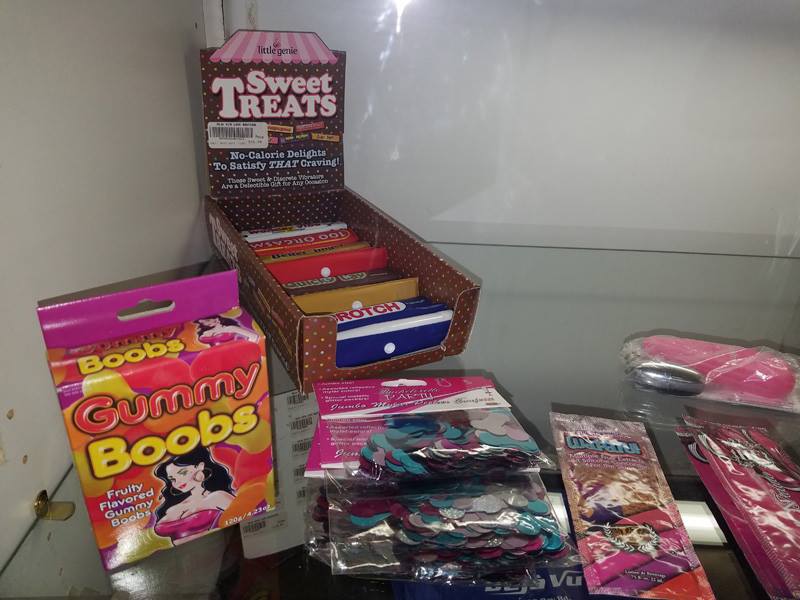With more than 50 years and 60 Love Boutique adult stores, Déjà Vu has proven to be a trendsetting adult retail group. Here, their Director of Operations, Ryan Carlson, explains what sets their stores apart, and notes the criteria they use to gauge interest in purchasing existing stores.
(Note: This “Store Spotlight” is a brand new section that will appear in upcoming issues of SE Magazine. We will be highlighting well-known multi-unit adult store brands from across the US, featuring interviews with key players within these organizations. Each of these brands has a story to tell, and it will be the goal of these Store Spotlights to tell the story of some of the industry’s most successful multi-unit store operators.)
—————————————————-
When the name Déjà Vu comes to mind, some people think of the world’s largest adult nightclub group with 100-plus clubs. But Déjà Vu actually got its start with adult theatres and stores in 1968 and is also among the oldest and largest adult retail groups in existence with approximately 60 Love Boutiques and other retail stores.
Larry Kaplan, legal correspondent for Storerotica Magazine, sat down with Ryan Carlson, Déjà Vu’s Director of Operations, to gain some perspective on the trendsetting adult retail group.
SE: What do the Déjà Vu and Love Boutique brands bring to the adult retail industry?
CARLSON: I think that a significant portion of the adult retail stores in the country are still the “trucker bookstore” mentality. While there’s nothing wrong with that and it definitely serves a market, the future of adult retail is clearly upscale, and Déjà Vu Love Boutiques and our various other upscale brands have been instrumental in moving that concept forward.
SE: How many Love Boutique stores and one-off branded stores are affiliated with Deja Vu?
CARLSON: There are about 60 affiliated adult stores in the Deja Vu group. The Love Boutique is our largest brand.
SE: Your ad in SE talks about buying existing adult stores. As far as potential investments, what does Deja Vu look when purchasing a store property?
CARLSON: I would say our first criteria is cashflow of at least $150,000 annually. They need to be situated in “safe” locations. Bookstores are generally not zoned into prime locations, but they must be in secure areas where guests will visit. And it must be a rational seller who understands a reasonable multiple on which to base a fair selling price and doesn’t expect the moon and stars.

SE: How many of your boutiques are attached or adjacent to adult nightclubs?
CARLSON: About a dozen of our boutiques are attached or adjacent to a club. Some are our older locations, some newer. Usually it’s a consequence of having extra available space that will either sit empty or be utilized for adult retail. Before adding a store to a club, we look at whether the type of traffic in the area that will be coming through that particular club would fit with an adult retail demographic.
SE: Can you discuss the symbiotic relationship between the two and how they can be mutually beneficial?
CARLSON: A large portion of the clientele at the boutiques — especially the more upscale ones — is dancers. So, the clothing, shoe and accessory sales are obviously paramount in those locations, adjacent to clubs. As for the other part of the symbiotic relationship, you can reduce costs by sharing management of the two businesses.
SE: Do you always look to add adult boutiques to existing clubs and new clubs you’re acquiring or is it an individual decision?
CARLSON: I think any multi-unit group of any kind is always looking to maximize its use of real estate, so if we have empty, underutilized, or underperforming space, that’s when we consider putting a boutique in the space.
I would say our first criteria (in regard to buying an existing store) is cashflow of at least $150,000 annually. They need to be situated in ‘safe’ locations. Bookstores are generally not zoned into prime locations, but they must be in secure areas where guests will visit. And it must be a rational seller who understands a reasonable multiple on which to base a fair selling price and doesn’t expect the moon and stars. — Ryan Carlson
SE: Arcade booths are still prevalent, possibly in part because of the anonymity of webcam sites. What are your thoughts on that? How do stores with booths fit into your mix and how do they differ from your other stores?
CARLSON: For our stores that have arcade booths, those numbers have remained relatively stable over the last decade. In fact, for five or six locations with arcades and theaters where we’ve kind of reinvented our marketing and figured out how to drive more traffic into the arcades and theaters, we’ve actually seen numbers increase.
SE: If your upscale boutiques and stores with booths appeal to distinctly different demographics, do you have many stores that appeal to both?
CARLSON: Yes, there are definitely a number of what I’d call the Macy’s-style stores; the ones with marble floors, well-lit atmosphere, and the female-friendly, couples-friendly demeanor that also have booth and arcade departments that do over $15,000-20,000 a week, just for the theaters/arcades.
The key to that success is to physically have a separate entrance, if possible, for the arcades and theatres in a retail section of the store that wouldn’t typically be patronized by couples and women. For example, you wouldn’t want your arcade entrance in the lingerie section. And it’s also critical to treat all guests respectfully, regardless of why they’re there.
I’ve seen the mix of upscale and arcades fail both ways. Where you have your typical interstate highway exit bookstore and a couple comes in to shop for something and is confronted by a clerk whose annoyed they’re wandering around because he’s used to just processing arcade customers all day long. And I’ve seen the other way, where you have a high-end store where a sales associate in a nice uniform is used to helping people choose $500-600 high-end toys all day long and looks at arcade customers with disgust.
There’s just some common-sense planning necessary to organize your store and coach your team to understand how to treat the two demographics correctly. I think the key is eliminating that judgmental mentality on both sides. You must have a team that understands that every penny is a good penny. You have to find a way to mesh together service of the two groups.
SE: Would you consider adding booths to an existing store that didn’t already have them or opening a new store with booths, if zoning allowed if you thought the location was right for both demographics?
 CARLSON: Yes, absolutely! Our philosophy is that if you can have booths at any store where it will fit into the neighborhood and you’re pretty certain the city and the community won’t push back, you should. It’s really free money.
CARLSON: Yes, absolutely! Our philosophy is that if you can have booths at any store where it will fit into the neighborhood and you’re pretty certain the city and the community won’t push back, you should. It’s really free money.
SE: Can you explain your Vuniversity training component?
CARLSON: Vuniversity is the lynch pin in our training program that enables our stores, clubs, restaurants and really our entire group to operate well. It’s our week-and-a-half long, highly intensive, hands-on, off-site management training program so every manager can nail down the best practices in a formal setting.
SE: Does Vuniversity only apply to your clubs or do your stores take part in the program as well?
CARLSON: The program applies to all of the different businesses. There is some differentiation between the different divisions, but the general concepts are the same: here’s our company culture; here’s how we want you to view your work; here’s how we want you to view your guests; here’s our standards and company policy. And unfortunately, the bureaucratic portion with all of our procedures.
SE: Is it a separate curriculum for the store attendees?
CARLSON: Typically, for the retail side, store people will spend the first four days of Vuniversity with the club managers. Then they break off for a retail-only section led by the senior retail team.
Most importantly, the purpose of a central training program is to teach people how we want them to be as leaders in our company. How you treat people is a lot more important than what you’re teaching them. And that’s one thing that we try to drive home with our Vuniversity program. That there’s just a certain way we want you to operate at work; and we believe that translates directly to the bottom line.
Larry Kaplan is the Legal Correspondent for StorErotica Magazine. Mr. Kaplan is a business broker in the sale and purchase of adult retail stores and adult nightclubs and the Executive Director of the ACE of Michigan adult nightclub state trade association. Contact Larry Kaplan at (313) 815-3311 or e-mail larry@kaplanstoresales.com.














You must be logged in to post a comment.